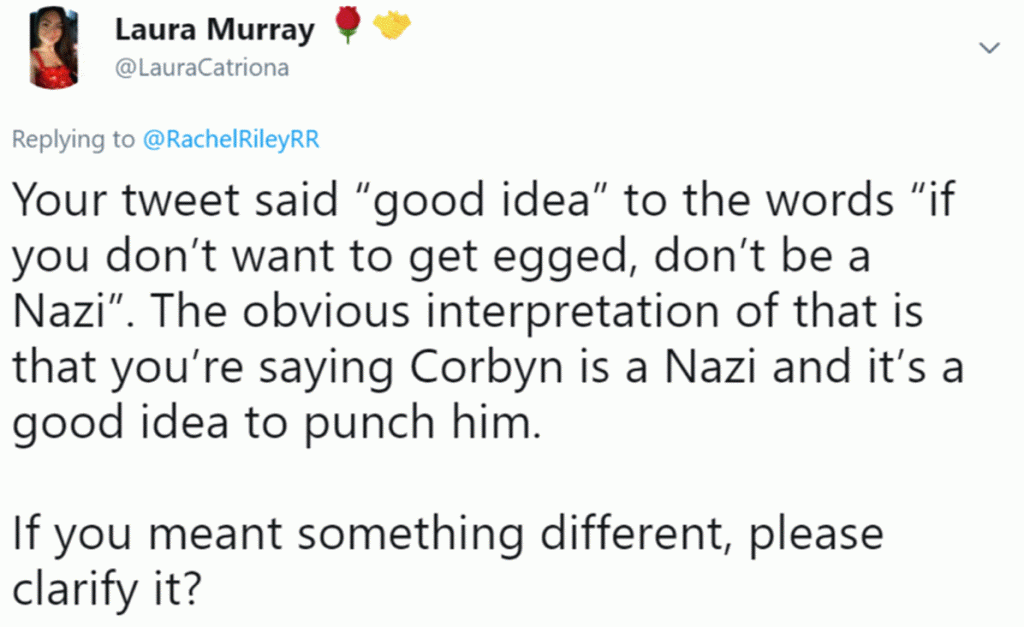Contact
January 17, 2022
On 10 January 2019, Owen Jones tweeted the following, referring to an incident in which an egg had been thrown at Nick Griffin, the former leader of the British National Party:

On 3 March 2019, the former Leader of the Labour Party, Jeremy Corbyn MP, was assaulted with an egg whilst visiting the Finsbury Park Mosque. Shortly after the incident, the television presenter Rachel Riley tweeted as follows (Ms Riley’s Tweet):

Although Ms Riley’s Tweet referred to the assault on Mr Corbyn earlier that afternoon, only a reader who was aware of the incident would have understood the reference from her use of the egg, and a rose to depict the Labour Party.
Later that day Laura Murray, who was the Stakeholder Manager for Mr Corbyn at the time, tweeted the following:

Ms Riley did not reply.
Ms Murray then posted this (Ms Murray’s Tweet):

Ms Murray’s Tweet did not reply to, quote-tweet, or otherwise include (e.g., by screenshot) Ms Riley’s Tweet, which meant that Ms Riley’s Tweet was not immediately available to anyone reading Ms Murray’s Tweet. Unless the reader manually searched through Ms Riley’s Tweets, he/she was dependent upon Ms Murray’s description of Ms Riley’s Tweet to understand what Ms Riley had said.
The Tweets provoked numerous responses. Many responses to Ms Riley’s Tweet showed that a significant number of people interpreted it to mean that Jeremy Corbyn deserved to be attacked because he was a Nazi. On the other hand, there were numerous responses interpreting Ms Riley’s Tweet to mean that Owen Jones was a hypocrite as he was showing selective support for acts of violence (i.e., egg-throwing) against politicians according to whether he supported them or not.
On 4 March 2019, Ms Riley responded to Ms Murray’s Tweet by quote-tweeting it as follows:

Ms Murray responded by saying:

Ms Riley did not respond.
Ms Riley issued proceedings against Ms Murray for libel. At a trial of preliminary issues in April 2020, Mr Justice Nicklin found that the natural and ordinary meaning of Ms Murray’s Tweet was: (i) Jeremy Corbyn had been attacked when he visited a mosque; (ii) Ms Riley had publicly stated in a tweet that he deserved to be violently attacked; and (iii) by so doing, Ms Riley had shown herself to be a dangerous and stupid person who risked inciting unlawful violence; people should not engage with her.
Nicklin J found that points (i) and (ii) were statements of fact, and point (iii) was an expression of opinion. Points (ii) and (iii) were defamatory at common law.
In her Defence, Ms Murray denied that her Tweet had caused or was likely to cause serious harm to Ms Riley’s reputation and that the defamatory statement of fact was substantially true under s 2 of the Defamation Act 2013. She also pleaded that the statement of opinion was her honest opinion under s 3, and that her Tweet was a publication on a matter of public interest under s 4.
Nicklin J found that serious harm had indeed been caused to Ms Riley’s reputation and that this had occurred before Ms Riley’s reply on 4 March 2019, in which she had quote-tweeted Ms Murray’s Tweet. Taking a snapshot at midnight following Ms Murray’s Tweet, it had received 94 responses, 661 re-Tweets and 1,764 likes. Although not in the league of mainstream media publications, that was evidence of significant publication, Nicklin J said. It was a reasonably safe assumption that most of those who re-tweet or like a Tweet agree with its message. As the essential message of Ms Murray’s Tweet was the opinion that Ms Riley was “as dangerous as she is stupid”, agreement with this strongly suggested that those who liked or re-tweeted Ms Murray’s Tweet accepted, as true, the factual allegation that Mr Corbyn “deserved to be violently attacked”. In Nicklin J’s judgment, on its own, this evidence provided a solid basis on which to infer serious harm to reputation.
As for Ms Murray’s defence of truth, Nicklin J rejected Ms Murray’s argument that the single meaning rule should be applied to Ms Riley’s Tweet, as it was clear from its terms that Ms Riley’s Tweet was not meant to be read simply at face-value. This was evidenced by the different reactions to it. These showed that, whilst some people appeared to understand it in the way described in Ms Murray’s Tweet, others did not. To that extent, the evidence supported the conclusion (which was obvious anyway) that Ms Riley’s Tweet was open to more than one interpretation and was therefore ambiguous. It could be (and was) read as suggesting that there was an element of hypocrisy/inconsistency in Owen Jones’ original Tweet: that whether the throwing of eggs at politicians was acceptable depended on whether the target’s views were regarded as objectionable. Alternatively, it could be (and was) read in a similar way to Ms Murray’s interpretation: that Jeremy Corbyn was a Nazi and he too deserved to be similarly attacked.
The important point was, Nicklin J said, that in her choice of words, and particularly the decision not to include Ms Riley’s Tweet in the post, Ms Murray’s Tweet had removed that important ambiguity. Instead, Ms Murray had pronounced what Ms Riley had said in Ms Riley’s Tweet as a matter of fact. That decision had led to Ms Murray’s Tweet being published (and republished) to people who were therefore unaware that what they were being told was only one interpretation of what Ms Riley had said.
In any event, Ms Murray’s defence of truth failed. What Ms Murray had stated, as a matter of fact, was not substantially true; it was at best half the story, presented to readers of Ms Murray’s Tweet as if it was the full story. In removing the ambiguity of Ms Riley’s Tweet, Ms Murray had misrepresented what Ms Riley had said.
As for the defence of honest opinion, there was no dispute that the statement was a statement of opinion. Further, the statement indicated the basis of the opinion. The main question was whether Ms Murray could show that “an honest person could have held the opinion on the basis of any fact which existed at the time the statement complained of was published” (s 3(4)(a) of the 2013 Act). Nicklin J held that, since he had found that the factual premise for the opinion was not true, Ms Murray’s honest opinion defence collapsed (London Artists v Littler Grade Organisation [1969] 2 QB 375). In Nicklin J’s view, although s 3(4)(a) of the 2013 Act permitted a degree of latitude in the proof of facts upon which an honest person could have held the expressed opinion, it did not provide an escape route for defendants who had expressed an opinion upon stated facts that they could not prove to be true.
As for publication on a matter of public interest, Nicklin J held that Ms Riley’s Tweet was a matter of public interest as it had been published on a public platform and was intended to be read widely. Further, Ms Murray had shown that she believed that publishing her Tweet was in the public interest. However, Ms Murray had not shown that that belief was reasonable because she had not included Ms Riley’s Tweet in her own Tweet. Deciding not to include it in order to prevent driving further traffic to it was not a good enough reason for depriving readers of accurate information about it, and its proper context. The fundamental journalistic principle that it was never in the public interest to misrepresent in an article the information or evidence obtained applied equally to Ms Murray given that she was seeking to avail herself of a s 4 defence. It was a critical failure not to include Ms Riley’s Tweet.
As for remedies, Nicklin J noted that there was an element of provocation in Ms Riley’s Tweet as she must have appreciated that its meaning was ambiguous. Further, in the context of her own high-profile campaign against anti-Semitism in the Labour Party, the risk of Ms Riley’s Tweet being read in the way interpreted by Ms Murray and others was obvious. Therefore, she could not be surprised and could not complain that her Tweet had provoked the reaction it did, including Ms Murray’s Tweet. Taking these factors into account, together with the seriousness of the allegation made by Ms Murray’s Tweet and the extent of its publication, Nicklin J awarded £10,000 in damages to Ms Riley. (Rachel Riley v Laura Murray [2021] EWHC 3437 (QB) (20 December 2021) — to read the judgment in full, click here).
Expertise